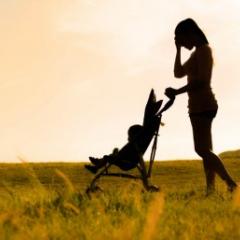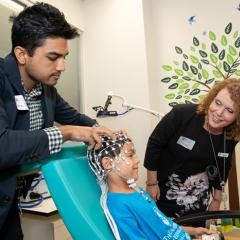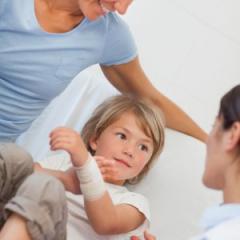Short of wrapping our kids in cotton wool, it’s hard to avoid the bumps and bruises of childhood. But sometimes, a fall at home or a head knock in sport should not be underestimated.
Paediatric Neurologist and Clinical Researcher Associate Professor Karen Barlow is a specialist in acquired brain injury in children and adolescence at The University of Queensland’s Child Health Research Centre. We caught up with Karen to learn about the signs and symptoms of concussion in children, possible treatments, and the road to recovery.
What are the symptoms of concussion and how can I tell if my child has been concussed?
Your child may have been concussed if he/she has significantly altered behaviour after an impact to the head or body. A loss of consciousness can be a sign of concussion, but this only occurs in 10 per cent of kids. Your child could have suffered a concussion, even if they weren’t knocked out. Common symptoms include:
- Confusion
- Fatigue
- Disorientation
- Headache
- Dizziness
- Clumsiness
- Sometimes there can be nausea and vomiting
- Difficulty with concentration and memory
- Changes in mood
Most symptoms begin immediately after the initial impact, but others can develop over the next few hours.
What to do if your child has had a concussion
If you suspect your child might have had a concussion or suffered a significant hit to the head, then they should not continue playing – sit them out. You should get your child checked out by a doctor or clinician experienced in recognising concussion. Sometimes your child can look very unwell and you may decide to call the ambulance services and/or take them to the emergency department.
Should I let my child sleep if I suspect they have concussion?
After your child has been allowed to go home, there are some very simple steps that you can do to keep them safe and encourage recovery:
- Rest in the first couple of days after injury. You don’t need to keep waking them up overnight to check on them.
- Treat any headaches with simple analgesics such as paracetamol or ibuprofen (see your GP if the pain continues after two weeks).
- After two days, encourage light activity such as walking outside and reading a book for 20 minutes. Gradually increase as they tolerate these activities.
- Encourage healthy lifestyles, get regular sleep, get help for any stress.
- Let the school know what has happened and gradually increase school attendance and school work. Most children are back at school full time after two or three weeks.
When can my child go back to playing sport after a concussion?
It’s important not to go back to playing sport too early. This is to avoid repeat injury while healing is occurring. Some people find that exercise can trigger symptoms. Therefore, we recommend a gradual return to activities. It’s important children return to school before they return to play.
How long does it take to recover from a concussion?
Children take longer to recover than adults and often have more symptoms. Most children have recovered within a month but for a smaller number of children, their symptoms can persist for several months. After the first week, you should see small improvements each day. If your child is still showing symptoms after one month, see your GP for extra help.
What are the long-term effects of a concussion?
We believe that for the vast majority of people, the long-term prognosis is excellent, and that your child will return to normal. Scientists are investigating the effect of repeated concussions in special groups such as athletes playing rugby, hockey or boxing. A doctor may recommend a child no longer play contact sports if he/she has had repeated concussions. A sports medicine or rehabilitation physician will often be involved with people who have a delayed recovery or repeated injuries.
For more information on returning to school and sport following a concussion, please refer to:



